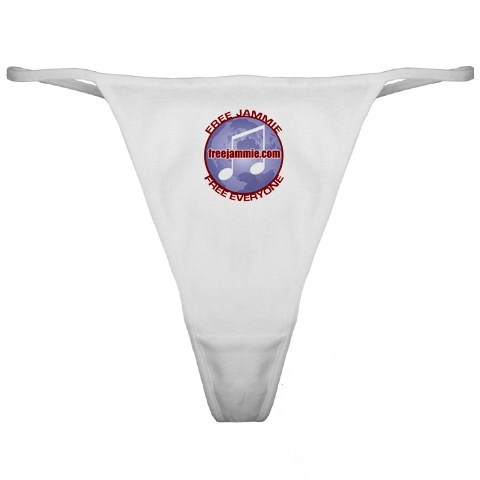Original URL: https://www.theregister.com/2008/08/05/riaa_mistrial_hint/
World's dumbest file-sharer: Judge to the rescue
Verdict may be nullified
Posted in Legal, 5th August 2008 15:57 GMT
The Judge who presided over the first successful prosecution of an American P2P file sharer has hinted that he has changed his mind - and may nullify the trial.
Jammie Thomas sold her knickers online (see pic) after being convicted of copyright infringement last year. A jury of her peers in Duluth, Minnesota wasn't impressed by what they regarded as a time-wasting trial, when she should have copped to a small fine:
"Her defense sucked... I don't know what the fuck she was thinking, to tell you the truth," said jury member Michael Hegg at the time.

Jammie Thomas fundraising thong
But now Judge Davis thinks that the basis of the record companies' pursuit of file-sharers sucks, too. It hinges on the prosecution's use of the "making available" argument. Last October, the prosecution successfully argued that leaving songs in a shared folder on a network means making them available, leaving the sharer liable for infringement damages. That's what Judge Davis told the Duluth jury, too. The problem is, the Copyright Act doesn't use the words "making available".
What the Act does do, however, is define five exclusive rights in the copyright 'bundle': Reproduction, adaptation, publication, performance and display. And for sound recordings, it defines "publication" as "offering to distribute copies or phonorecords to a group of persons for purposes of further distribution, public performance, or public display".
Which seems clear enough.
But the courts have expressed differing views on the matter. Within the space of a fortnight earlier this year, we saw two courts accept the argument that shared folders aren't publication while another rejected it. (See Is sharing a folder copyright infringement?.)
Yesterday, WiReD's David Kravets reports, Thomas pointedly asked the appeals specialist retained by the RIAA, Donald Verrilli, why Congress hadn't made it clear that it didn't need to prove anything: The burden of proof is on the defendant, and by passing the Act Congress made its intentions clear.
"If the owner of a video rental store made an unauthorized copyright video available on the shelves of the store," the RIAA argued in its brief, "courts did not require copyright owners to sit monitoring the store and waiting for someone - if they could catch him - to rent or buy the video in question. Rather, the offer to sell, rent or give away the video has always been enough."
The RIAA also argues that shared songs violate its exclusive right to authorise distribution - and that's where courts have found its arguments to be weakest.
"The First Circuit has squarely considered and rejected the proposition that copyright liability arises where the defendant authorized an infringement, but no actual infringement occurred… Authorization is sufficient to give rise to liability, but only if an infringing act occurs after the authorization."
(It's easy to forget, that the law mentions "distribution" merely as an example of the publication right, not the other way around.)
Maritime legal expert Brian Toder - dismissed and then rehired by Thomas as her attorney - says that if the only person who demonstrably downloaded the songs was the RIAA's enforcement contractor MediaSentry, then no liability should be attached.
A dismissal of the original case, hinted at yesterday, would be a sensational verdict - but would still leave the matter unresolved. The verdict would (naturally) be appealed and the matter would head towards federal courts.
You can see why the RIAA has pushed for "intentional inducement to infringe" to be added to the legal code - a move that would make tape recorders illegal. ®